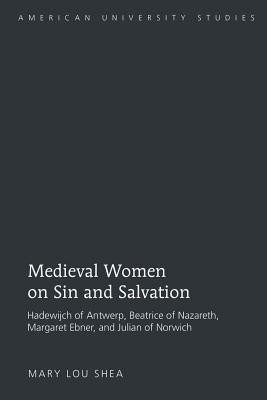
- We will send in 10–14 business days.
- Author: Mary Lou Shea
- Publisher: Peter Lang Inc., International Academic Publishers
- ISBN-10: 1433109484
- ISBN-13: 9781433109485
- Format: 15.2 x 22.9 x 1.6 cm, kieti viršeliai
- Language: English
- SAVE -10% with code: EXTRA
Medieval Women on Sin and Salvation; Hadewijch of Antwerp, Beatrice of Nazareth, Margaret Ebner, and Julian of Norwich (e-book) (used book) | bookbook.eu
Reviews
Description
Hadewijch of Antwerp (c.1200?-1240), Beatrice of Nazareth (1200-1268), Margaret Ebner (1291-1351), and Julian of Norwich (1343-1416/19) are best known for their mystical experiences and literary styles. Medieval Women on Sin and Salvation explores the reality that these women understood their encounters in primarily theological categories. It is well documented that Anselm of Canterbury's 1098 Cur Deus Homo was quickly and widely adopted by late medieval religious men. Given the deeply relational, somewhat unconventional, yet clearly orthodox interpretations of Anselm's theory expressed by Hadewijch, Beatrice, Margaret, and Julian, it would seem that nuns, beguines, and devout lay women were compelled by the same understanding of Atonement as the priests, monks, brothers, and lay men of the era. Unable to offer academic theological treatises, given the constraints of their age, these women managed to convey, through their writings, profoundly theological insights into the crucial Christian concepts of the natures of soul and sin, the Fall, and the Incarnation and its benefits, both for God and for humanity. This book offers valuable new insights and is suitable for upper division undergraduate classes and graduate courses in the history of Christianity/Medieval Christianity, theology, spirituality, and women's studies.
EXTRA 10 % discount with code: EXTRA
The promotion ends in 21d.14:47:09
The discount code is valid when purchasing from 10 €. Discounts do not stack.
- Author: Mary Lou Shea
- Publisher: Peter Lang Inc., International Academic Publishers
- ISBN-10: 1433109484
- ISBN-13: 9781433109485
- Format: 15.2 x 22.9 x 1.6 cm, kieti viršeliai
- Language: English English
Hadewijch of Antwerp (c.1200?-1240), Beatrice of Nazareth (1200-1268), Margaret Ebner (1291-1351), and Julian of Norwich (1343-1416/19) are best known for their mystical experiences and literary styles. Medieval Women on Sin and Salvation explores the reality that these women understood their encounters in primarily theological categories. It is well documented that Anselm of Canterbury's 1098 Cur Deus Homo was quickly and widely adopted by late medieval religious men. Given the deeply relational, somewhat unconventional, yet clearly orthodox interpretations of Anselm's theory expressed by Hadewijch, Beatrice, Margaret, and Julian, it would seem that nuns, beguines, and devout lay women were compelled by the same understanding of Atonement as the priests, monks, brothers, and lay men of the era. Unable to offer academic theological treatises, given the constraints of their age, these women managed to convey, through their writings, profoundly theological insights into the crucial Christian concepts of the natures of soul and sin, the Fall, and the Incarnation and its benefits, both for God and for humanity. This book offers valuable new insights and is suitable for upper division undergraduate classes and graduate courses in the history of Christianity/Medieval Christianity, theology, spirituality, and women's studies.


Reviews